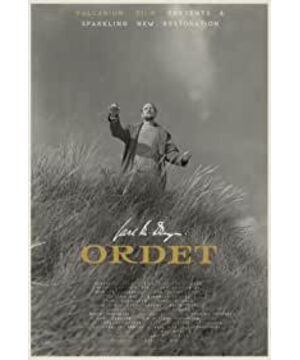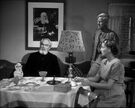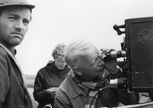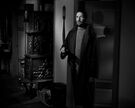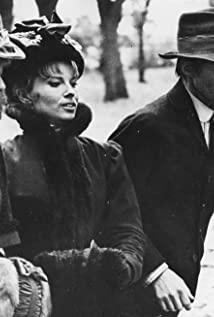The film mainly relies on the montage inside the lens for narrative, lyrical, expressive, intriguing composition and light.
1. After a round of greetings that had nothing to do with the overall situation, Inge was about to wrap the ball of wool and asked his father-in-law if he could help. Father-in-law readily agreed. The wool entangled in his hands made him immobile, which meant that he was passive at the moment, and the whole situation was under Inge's control.
2. Inge eagerly asked his father-in-law what he thought of Annie. The father-in-law understood Ying's intentions, so he discarded the wool, went to the side, and got rid of Ying's control. Inge's first effort failed.
3. Inge continued her efforts. She sat next to her father-in-law and discussed the topic of "love". A picture of the ancestor on the wall at the rear left silently watched the conversation between the two. He is currently in the dark and has not yet fully participated in it-but at the same time it shows that Yingge has been under the watchful eye of "patriarchy", and his strength is weak in comparison. However, Yingge, who is on the far left of the screen, is still a temporary "strong man" established by the conventions of the lens language.
4. The topic gradually shifted to father-in-law Ying's wife. This is a major mistake in Yingge's strategy. It directly caused the father-in-law to prove that he "knows how to love", occupying the left and even the center of the screen, and he won the right to speak. His head is stacked with the photo of his deceased wife, strengthening his expression of "love".
5. Inge went on another offensive, but this time it was obviously more strenuous. The initial position of the two of them is far apart from before, and they look inside and out, it seems that the outcome of the conversation failed cannot be changed.
6. However, the clever Yingge succeeded in attracting his attention again with an attractive condition that his father-in-law could not refuse: giving birth to a son. For the father-in-law, for the ancestors (the portrait on the wall reappears), for this patriarchal and faith-oriented family, the value of a male successor is far greater than that of a slightly different faith , Possible future female helpers. Therefore, Axiom was moved by it as it should.
7. But Inge made another mistake. At the critical moment when his father-in-law’s consent was about to be obtained, Inge told him that Anders was not with his brother, but went to find Annie alone—without his consent. The father-in-law felt that his authority had been scorned and violated. Even the promise of "birth a son" could not calm his anger. Moreover, it was still an erratic promise that had not yet received divine enlightenment. The camera shifts to the left, and the "predecessor" on the wall has also completed the "intervention" at this time, and together with the father-in-law formed an attack on Yingge, and under the influence of "patriarchy", he has an overwhelming advantage over this weak woman.
8. Finally, the conversation broke down. The father-in-law is far away from Inge, and the double shot becomes a single person, which means the alienation of the relationship.
9. The father-in-law came to the pigsty alone and sat down very much. But Yingge still didn't give up, and followed closely. A fence blocked them, still retaining the gap between the two just now. The position of the characters and the direction of the light also hinted at the core position that Lao Zhangren possessed—although from an environmental point of view, it was lingering—and that stubbornness.
10. But then, the scheduling of Yingge indicated that she would win the final victory. After escaping from the black room of the "patriarchal" order, Inge was completely liberated, and gradually persuaded his father-in-law with his intellect and wisdom, and squeezed him overwhelmingly in the corner. If it is said that in the house, the father-in-law is the holder and user of power, and is backed by a solid order that has been formed over thousands of years, then here, Yingge has a more powerful and irresistible envelope. Power will subvert the former-because she is with the light and God at this time. She is the incarnation of God.
11. The father-in-law gave up the last resistance, walked out of the fence, and the two reconciled-although the restoration of the initial position tells us that such harmony is likely to be only temporary.
In addition, in a later shot, Delaire cleverly used a shot from the outside-the reason why it is said to be "smart" is that this is the first time such a lens has been used in the whole film, and it is The corresponding scenario is that the doctor rescued Inge, who had almost died of a dystocia, and then the father-in-law watched the doctor leave from the window. Thus, there is an interesting connection between the language of the lens and the content of the story: if Inger was persuading his father-in-law in the pigpen, that window was just an accidental blessing of God for the family, a glimpse in the gap, So here, Dreyer used his skills to tell everyone that this family has been completely liberated by God from the inside out, and the people inside who were stubborn, fearful, and skeptical, calmly let God live in his own. heart.
View more about Ordet reviews


